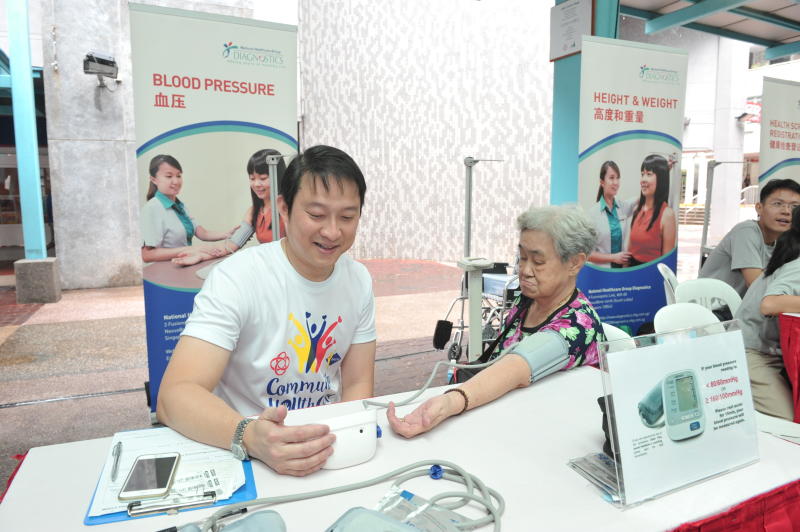New workgroup set up to fight antimicrobial resistance
Sign up now: Get ST's newsletters delivered to your inbox

File photo of Dr Lam Pin Min checking the blood pressure of an elderly person during a health event in his constituency.
PHOTO: PEOPLE'S ASSOCIATION
Follow topic:
SINGAPORE - Microbial bugs are becoming increasingly resistant to drugs, making it more difficult to treat certain diseases.
To reduce antimicrobial resistance (AMR), which can be caused by the overuse or abuse of medication like antibiotics, Singapore has set up a One Health AMR workgroup to provide a whole-of-government effort.
The workgroup will focus on three main areas - coordinating the surveillance activities of the problem across the different agencies, research on the factors that are related to it, and cooperating with overseas partners, as diseases may cross borders.
Senior Minister of State for Health and Transport Lam Pin Min, who announced this at a dialogue on Wednesday (Nov 1), said that this national strategic action plan sets the framework for Singapore's response to AMR.
"It is only a matter of time after the discovery of an antimicrobial and its introduction to market that a microorganism develops resistance to it, often fuelled by the overuse or abuse of these antimicrobials," said Dr Lam, who was speaking at the Public Health Thought Leadership Dialogue on Antimicrobial Resistance, held at the National University of Singapore.
Should antibiotics be no longer effective, then even simple infections could kill.
Dr Lam said the plan includes education of the public to raise awareness of the problem and what they can do to prevent it
It involves even children, with school activities to teach them about the risk of AMR.
"These can include simple steps such as maintaining good hand and personal hygiene, to more in-depth understanding of antibiotics and how they work," he said.
Aside from public education, the One Health agencies will also work with professionals and industry.
Dr Lam said three key elements in Singapore's fight is:
- Integration of the various agencies, such as the coordination of surveillance activities and data sharing across sectors. "This is important to improve our understanding of how AMR develops and circulates between humans, animals, food and the environment," he said.
- In-depth research to understand the complex factors influencing AMR. He highlighted a recent four-year study by clinicians and researchers of National University Health System, Singapore General Hospital and the Communicable Diseases Centre. The study focused on the use of novel diagnostics, infection control strategies and behavioural sciences to strengthen institutional and national capability in targeting drug-resistant bacteria.
- International collaboration. "Our domestic efforts must be complemented by cooperation and partnerships with our neighbours and international counterparts, where we learn from each other through the sharing of best practices in our collective effort to fight AMR," he said.

